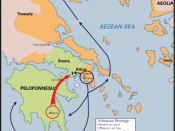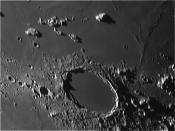Question #1 : Please discuss the political organization of the Greek city- states, particularly Athenian democracy at the time of Pericles, Plato, and Aristotle. Also discuss the backgrounds of Socrates, Plato and Aristotle and the fate of the Greek city-states historically.
During the time of Pericles, Plato, and Aristotle, Greece was divided into city-states with a wide variety of constitutions, ranging from Sparta's military dictatorship to Athens' direct democracy.
Most city-states had about 300,000 people, each divided into one of three classes : citizens, metics, or slaves. The citizens represented a total of one - third the population. The members of this class participated directly with politics in the various institutions, and decisions were derived by popular vote, known as direct democracy. This class was further divided into three councils : Assembly of Ecclesia, Council of 500, and the Council of 50. The largest council was the Assembly of Ecclesia, which was a body of all male citizens over the age of twenty.
The Council of 500 consisted of 500 members, chosen from lottery and election from the Assembly of Ecclesia. The Council of 50 was made up of 50 members chosen from the Council of 500. The second class of people in the city-states was the Metics. This class was made up of people that were not citizens, either because they were not born in the city-state, or they were prevented from being citizens. The third class were the slaves. These people were captured from wars and subject to serve the city-state without pay. The interesting observation in the organization of the Greek city-state is that only one-third the population had any power. The other two thirds (made up of metics and slaves) were subject to the decisions derived by the citizens, and contained no power nor voice...



Very Good
Well written, good length, and has references which should always get a plus rating for that alone.
1 out of 1 people found this comment useful.